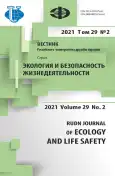Study of the role of natural and anthropogenic factors in the formation of water quality in small rivers on the example of the Veletma river in the Nizhny Novgorod region
- Authors: Smirnova M.V.1, Batanina A.I.1
-
Affiliations:
- Volga State University of Water Transport
- Issue: Vol 29, No 2 (2021)
- Pages: 162-173
- Section: Geoecology
- URL: https://journal-vniispk.ru/2313-2310/article/view/323849
- DOI: https://doi.org/10.22363/2313-2310-2021-29-2-162-173
- ID: 323849
Cite item
Full Text
Abstract
Small rivers of Central Russia often experience a high anthropogenic pressure, and at the same time their study and measures taken to preserve them are incomparably more modest than for large rivers. On the example of the Veletma river in the Nizhny Novgorod region, the factors affecting the formation of the water quality of the small river are considered. The ecological and geographical characteristics of the Veletma river are given. It is shown that the current methodology for assessing the water quality of large rivers by the Specific Combinatorial Water Pollution Index does not allow to determine what is the contribution of anthropogenic pressure to the deterioration of water quality, and what is the contribution of natural factors. Studies of a number of physical and chemical characteristics of the waters of the Veletma river have shown that on a short section of the river, which is less than 400 m, there are significant changes in the physical and chemical composition of water, reaching 45-95%. Such significant changes are associated on the one hand with the influence of the treatment facilities of the city of Navashino, and on the other hand, with the special location of the lake Zelenoe in the path of the river. Satellite images of the Veletma's confluence with the lake Zelenoe show the plume. It is suggested that the lake is characterized by the same processes that take place in the confluence of large and medium-sized rivers into the seas and lakes, called marginal filter, in which not only suspended but also dissolved impurities are retained. This fact is confirmed by laboratory studies.
About the authors
Maria V. Smirnova
Volga State University of Water Transport
Author for correspondence.
Email: igoninam@yandex.ru
ORCID iD: 0000-0002-3483-5482
Cand. Tech. Sci., Associate Professor of the Department of Hydrodynamics, Theory of the Ship and Environmental Safety of Vessels
5 Nesterova St, Nizhny Novgorod, 603950, Russian FederationAnastasia I. Batanina
Volga State University of Water Transport
Email: nbatashka@gmail.com
3rd year student of the “Technosphere Safety” course
5 Nesterova St, Nizhny Novgorod, 603950, Russian FederationReferences
- Tkachev BP, Bulatov VI. Small rivers: state-of-the act and ecological problems: analytical review. Novosibirsk: SPSTL SB RAS; 2002.
- Astashin AE, Sotkina SA, Badin MM, Ryzhov EV, Samoilov AV. Dynamics of development of network of elementary water currents of the North of the forest-steppe zone of the Nizhny Novgorod region(on the example of the catchment basin of the river Sundovik) during 1984–2016. Bulletin of VSAWT. 2016;(48):15–24.
- Smirnova (Igonina) MV, Cheban EYu, Volodchenko EV, Berdnikova EYu, Solina ES. Hydro-ecological research of the Gorky and Cheboksary reservoirs sites and their tributaries in summer of 2017. Bulletin of VSAWT. 2017;4(53):98–108.
- Yasinskii SV, Venitsianov EV, Vishnevskaya IA. Diffuse pollution of water bodies and estimation of export of biogenic elements under different scenarios of water use in the watershed. Water Resources. 2019;46(2):232–244.
- Shaban VP. (ed.) Surface water resources of the USSR. Hydrological study. Vol. 10. Verkhne-Volzhsky district. Leningrad: Gidrometizdat Publ.; 1966.
- Astashin AE, Badin MM, Samoilov AV, Ryzhov EV, Vlasov AV, Fomina AI. Landscape structure of the territory of the Veletma watershed of the Nizhny Novgorod region. Natural and Technical Sciences Journal. 2019;(1):90–95.
- Georgievskii VYu. (ed). Scientific and applied reference: the main hydrological characteristics river basins of the Upper Volga River. Livny: State Hydrology Institute, Mukhametov G.V. Publishing; 2015.
- Dzhamalov RG, Myagkova KG, Nikanorov AM, Reshetnyak OS, Safronova TI, Trofimchuk MM. Hydrochemical runoff of the Oka basin’s rivers. Water and Ecology. 2017;4(72):26–39. http://dx.doi.org/10.23968/2305–3488.2017.22.4.26–39
- Tereshina MA, Sokolov DI, Erina ON, Vilimovich EA. Natural background or human impact: water quality of the Linda and Kudma rivers. Problems of Ecology of the Volga Basin: Proceedings of the 4th All-Russian Scientific Conference. Nizhniy Novgorod: VSUWT; 2019. p. 28.
- Onishchenko GG. Hygienic evaluation of the population of the Russian Federation with drinking water and measures for its improvements. Hygiene and Sanitation. 2009;(2):4–12.
- Lisitsyn AP. A marginal filter of the oceans. Oceanology. 1994;(34):735–747.
- Potemkina TG. Baikal rivers estuaries. Priroda. 2014;(12):13–21.
- Yakovlev SV, Karelin YaA, Laskov YuM, Voronov YuV. (eds.) Industrial wastewater treatment. Moscow: Stroiizdat Publ.; 1985.
Supplementary files









